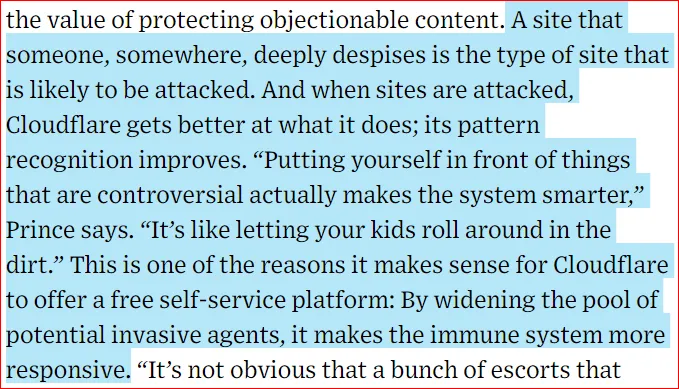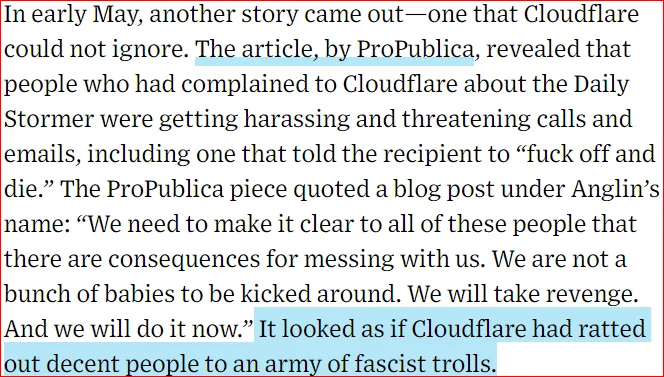Fascinating piece by Matthew Johnson from Wired.com on Cloudflare's decision to drop The Daily Stormer titled Why Cloudflare Let an Extremist Stronghold Burn.
The implications of this story go far beyond a simple business decision to drop a client. It hits on much broader themes including free speech, information security, censorship, and vigilante justice.

The Hook
If your interest isn't piqued yet, then perhaps this framing from the Wired piece will help:

You'll have to read the article to see where Turkish brothels play into Cloudflare's origin story.
Background
Cloudflare
Cloudflare is an American tech company whose primary service is to provide millions of clients protection against DDoS attacks. DDoS, or a distributed denial-of-service attack, attempts to take down a website or online service by flooding the target with traffic. The company is headed by Matthew Prince, an alum of both Harvard Business School and University of Chicago Law School, where he attended lectures by a relatively unknown professor with a funny name, Barack Obama.
Prince firmly believes that the space in which Cloudflare operates, the "invisible infrastructure layer of the internet" is not where speech should be limited or restricted, no matter how vile the content.
The Daily Stormer
The Daily Stormer is a neo-nazi website that largely spreads anti-Semitism & white supremacism. They're known to peddle Jewish conspiracies, and their leaders have called for the "slaughter" of Jewish children (despite being of Jewish heritage themselves).
As one might suspect, a controversial and vile site like the Daily Stormer is a juicy target for vigilante hackers' DDoS attacks. That led the Daily Stormer to subscribe to protection services from Cloudflare.
Controversial Clients Strengthen Cloudflare's Service
It's worth noting that controversial clients like neo-nazi sites and brothels actually improve Cloudflare's security services:

So while there might be socio-political reservations for any company to associate neo-nazis, Cloudflare actually had a vested interest in servicing groups that were ripe for such attacks.
The Controversy Explodes
The controversy over Cloudflare's protection of the Daily Stormer began to 'flare' up after the Southern Poverty Law Center posted a blog titled "Cloudflare Optimizing Content Delivery For At Least 48 Hate Sites".
And it was only exacerbated when ProPublica reported that Cloudflare was effectively passing on legitimate complaints about The Daily Stormer directly to them, leading to harassment:

How One Major Internet Company Helps Serve Up Hate on the Web by Ken Schwencke
This forced a very difficult decision for Prince & Cloudflare:

Cloudflare Drops Daily Stormer After Being Left an "Out"
After heavy deliberation, Prince announced that Cloudflare would be terminating the Daily Stormer's account. In what many have described as a fortuitous turn of events, Prince cited the "tipping point" for this decision was "that the team behind Daily Stormer made the claim that we were secretly supporters of their ideology."

Prince was uneasy with the decision he'd just made:

Queries
Did Cloudflare make the right decision in cutting off the Daily Stormer? Does the answer change if viewed through the lens of a socio-political issue versus a business decision?
Is there a circumstance in which it would be permissible for companies like Cloudflare to drop protection for its clients due to content concerns?
If the Daily Stormer didn't suggest that Cloudflare leaders were secretly sympahtizers of their ideology, would Cloudflare still have droped them? Can't help but think that was a very convenient excuse for this decision.
Parting Thoughts
Ultimately I think I'm OK with Cloudflare's decision, because at the end of the day it was a private business decision, and not pressured or mandated from any authority or government. Sure, there were plenty of outside pressures, but that's par for the course when it comes to any business that markets to the general public. I also firmly agree with Prince's belief that there are many places where regulating content may be necessary, and the space that Cloudflare occupies generally should not be one of them.
I'm also not sure I completely share Prince's concerns about wielding the power of deciding who exists on the internet. That probably overstates Cloudflare's role in the ecosystem. And if there are concerns about the power of large entites like Google and Amazon, then I think we also need to view these through the lens of antitrust & anti-competitiveness issues.
I'd love to know what the Steemit community thinks of this case study, as we seem to have a wide range of ideologies here.
|| @bubbleboy ||

